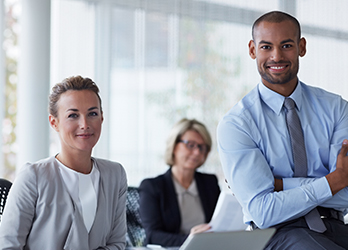- An overlooked group of talent. Autistic and neurodivergent candidates are an overlooked group of talent that are capable of filling key roles for organizations.
- Employers are aware and interested. 61% of hiring leaders are investing in initiatives to hire neurodiverse candidates as a way to help overcome skills shortages. However, the traditional interviewing practices may be thwarting these efforts by making it hard for autistic candidates to best showcase their skills.
- Tips for improving interviewing processes. Employers can set neurodiverse candidates up for success with a couple different strategies, such as sharing interview questions well in advance, allowing candidates to re-record video answers, offering other non-verbal ways to respond to questions and thoroughly explaining questions via examples.
- A win-win situation. The benefits of having a diverse workforce are many, and it all starts with talent leaders creating more access to job opportunities for people from overlooked talent pools.
In 2021, the Autism Society of America decided that Autism Awareness Month, which occurs every April, needed a messaging makeover. The change may seem minor at first blush, but the move from Autism Awareness Month to Autism Acceptance Month speaks volumes.
According to the organization, the new language represents a long-held belief by autism advocates that helping those with autism lead more fulfilling lives is far more desired than treating the condition as an illness. Hence, the transformation from awareness to acceptance.
In the employment context, that means seeing people with autism as viable candidates for open positions. Historically, talent leaders haven’t always done so.
“Autistic and neurodivergent candidates are a completely overlooked group of talent, as 85% of college graduates with autism are underemployed or unemployed,” said Colin Willis, industrial and organizational psychology program manager at HireVue, a Salt Lake City-based company that provides video interviewing, assessments and text-enabled recruiting tools. “Not only is this a crisis from a moral perspective, it’s an economic travesty at a time when businesses are so desperate to fill roles.”
Employers’ attitudes may be changing, however. According to HireVue’s "2023 Global Trends Report," 61% of hiring leaders are investing in initiatives to hire neurodiverse candidates as a way to help overcome skills shortages.
The problem is that traditional interviewing practices may be thwarting these efforts by making it hard for autistic candidates to best showcase their skills. Integrating different strategies could help.
For example, research from the science teams at HireVue, Integrate Autism Employment Advisors, and Colorado State University revealed interesting information about how candidates with autism perform on game-based interview assessments. Generally, this first-of-its-kind study found that 263 autistic candidates scored the same as 323 general graduate applicants.
“Our survey and research results show there is greater visibility around the need to focus on untapped talent,” Willis said “Also, it demonstrates how much more needs to be done to understand the way unconscious biases and outdated processes can inhibit broader employment goals.”
Tips for Improving the Interview Process
To that end, Willis offers the following tips for employers interviewing applicants on the autism spectrum:
Set candidates up for success. Willis explains that for neurodivergent and autistic candidates, having additional time and resources to help prepare for an interview can make a huge difference. That’s because neurodivergent candidates often experience increased anxiety in new and unfamiliar situations, above and beyond that of their neurotypical peers. Before the interview even takes place, employers can offer the following support:
- Provide a thorough preview of the interview process to help candidates better understand what to expect.
- Share interview questions in advance to give candidates more time to think through their responses, which can help them feel less anxious and answer questions more comfortably.
- Provide additional time for candidates to prepare for the interview.
- Share interviewing tips for neurodivergent candidates.
Allow candidates to re-record video answers. If you’re using a video interview platform, Willis recommends giving candidates the option to re-record their responses. That way, candidates won’t be as worried about making a mistake on their first attempt.
Try various types of questions and assessments. According to Willis, employers with successful neurodiversity initiatives have found success by augmenting traditional interviews with other activities, such as whiteboard sessions or screen-sharing opportunities. “This type of skills showcase allows candidates to demonstrate their abilities and problem-solving skills, as opposed to relying solely on verbal responses and explanations,” he said.
Explain questions thoroughly and provide examples. Understanding ambiguous or unclear questions can be one of the trickiest parts of an interview for autistic candidates, according to Willis. For example, asking a candidate how they “found” their prior position could yield the response “I found the position difficult” or “I found the position online.” Employers can help alleviate confusion for candidates by providing as much detail as possible in their interview questions. Willis recommends using scenario-based questions where candidates get a real-life illustration of the question being asked. “This will ensure your question cannot be interpreted in multiple ways,” he explained.
A Win-Win Situation
The benefits of having a diverse workforce are many, and it all starts with talent leaders creating more access to job opportunities for people from overlooked talent pools. Willis said that by adopting more inclusive practices, leaders have a chance to truly diversify their workforce.
For instance, he notes, it’s well-documented that organizations that do not mention disabilities in their diversity initiatives are less likely to attract talent from that group. Additionally, job boards that are not designed to be accessible to people with disabilities may discourage some individuals from applying.
“These are the things recruiters and hiring managers can change straight away,” Willis said, adding that when it comes to getting neurodiversity initiatives right, everything — from the application to the interview process to manager training — matters.
“This is a long-term commitment, but one that benefits everyone when it’s done well,” he notes.
Editor’s Note: Additional Content
For more information and resources related to this article see the pages below, which offer quick access to all WorldatWork content on these topics:








